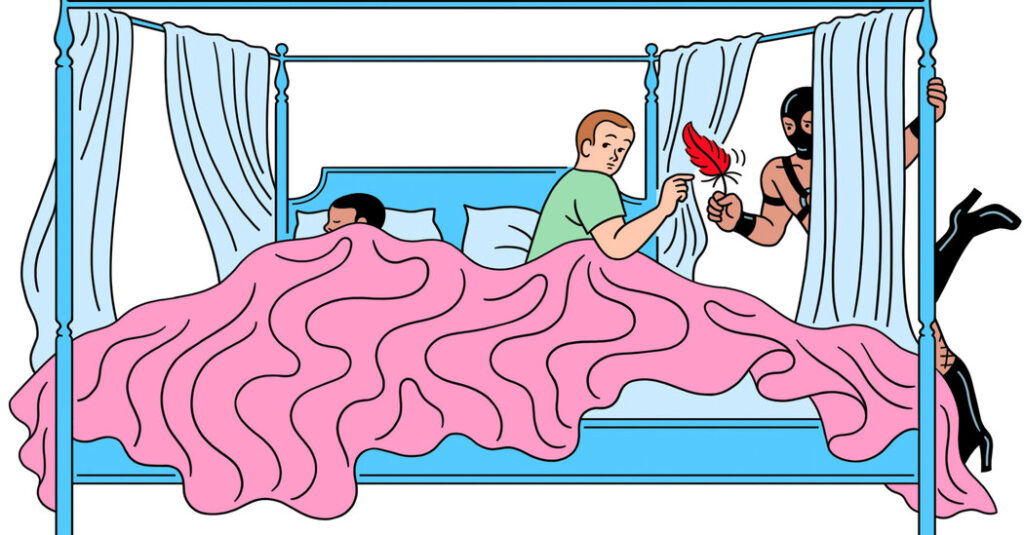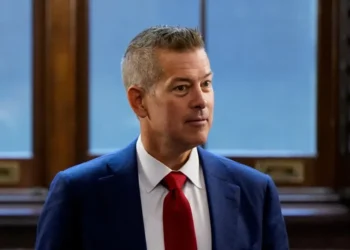My partner and I have been in a monogamous same-sex relationship for 12 years. Since my partner went sober about nine years ago, his libido has gone way down. We have tried many things to meet in the middle, including counseling, scheduling intimacy and role play. These things work briefly, and then we resume a “normal” in which I often feel my desires remain unfulfilled. I have sought refuge in pornography and lots of reading about sex. Amid that, I came upon several forms of kink I was drawn to.
I spent about 18 months thinking about these desires, trying to will them away, thinking that my wonderful-yet-vanilla sexual partner would not be into it. When these desires did not go away, I broached the topic with my partner. He said he was not interested in any of it, but that we could “keep revisiting” the issue. In the past, “keep revisiting” has been code for “never going to happen, I just do not want to disappoint you right now.”
Is it ethical for me to seek to revisit the boundaries of the relationship, and seek to move into a consensual nonmonogamous arrangement in which I can seek to explore these kinks? Alternatively, is there an ethical way to frame kink exploration as nonsexual, and therefore not violating monogamy? For the kinks I would like to explore, there would be skin contact (but not genital contact or exposure) in some, and genital exposure (but no contact) in others. — Name Withheld
From the Ethicist:
Yes, mutual understandings can be revisited, and you can seek to renegotiate the terms of your relationship. The important thing is that any such conversation happens openly and, ideally, in a setting that supports both of you, perhaps with a couples counselor who could help ensure the dialogue doesn’t collapse into defensiveness or shame.
What won’t work is to reclassify the sort of kink you have in mind as separate from sex. You’d be pursuing erotic encounters, involving arousal, vulnerability, intimacy. To pretend otherwise would be a semantic dodge, not an ethical solution. You’d be rewriting the relationship’s rules on your own.
Your relationship is unlikely to be helped, of course, if your sexual frustration curdles into resentment — a retreat into sour semi-celibacy. If that’s what looming, there’s a good case for speaking frankly about what you want and what your partner can or cannot give, and seeing whether the two of you can agree on new terms and boundaries. Even if what you require and what he’s able to offer remain fundamentally mismatched, you’ll at least know you’ve acted with integrity and treated your partner with respect. Transparency may not preserve the relationship, but it can preserve both your dignity and his.
A Bonus Question
My 16-year-old sister was recently diagnosed with anorexia nervosa. It’s been hard on my family to see her going through this. She’s seeing both a nutritionist and a psychiatrist, and to support her recovery, my mom and I were told not to criticize our bodies in front of her, to finish our meals and to avoid comments like “I shouldn’t have eaten that last piece of cake.”
I’m an 18-year-old girl and have always been pretty athletic, but over the past year I’ve gained some fat I’d be happy to lose. I don’t feel good in my body and want to change that, but I’m not sure it’s the right thing to do. If I lose weight, my mom will probably worry I’m developing an eating disorder, and my sister will notice, which could set back her recovery. The other option is to maintain my current weight for her sake until she’s better, which could take months or years, but that would mean staying unhappy with myself. — Name Withheld
From the Ethicist:
You’re doing something generous and difficult: supporting your sister through an eating disorder. Still, your interests shouldn’t be entirely subordinated to hers. The rules you’ve been given are designed for her recovery; they weren’t created with your needs in mind. So if you can tolerate your mother’s worry that you might be at risk, tell her you’d like a short meeting with your sister’s psychiatrist to explain your position. The psychiatrist may refer you elsewhere, which would be fine; the point is to register that being asked never to voice concern about your own body leaves you in a difficult spot. And a professional could make a judgment about whether you need different habits or a different frame of mind. If you’d rather not involve your mother, you may, at 18, seek counseling on your own. One way or another, your family should be able to attend to your sister’s needs without erasing yours.
Readers Respond
The previous question was from a high schooler who wondered whether he was obligated to disassociate, in real life and on social media, from an acquaintance who was said to have done racist things. He wrote:
The other day, I posted a photo of a soccer player, whom I consider to be an acquaintance — I’m closer to the photographer — to my Instagram story. (I’m in high school, as are all the people I’m discussing.) Shortly after, a friend D.M.’ed me to say that the soccer player is “a racist” who “did blackface and said the N-word.” Even so, I decided not to delete it. I told my friend that even if I’d known earlier, I wouldn’t have completely cut the soccer player off. … My relationship with the soccer player amounts to chatting in class and occasional texts. I didn’t see a problem with that level of contact even if he had said or done racist things. … My question is: If I claim to be an equality-driven liberal (which I imply on my Instagram), am I obligated to completely disassociate from anyone I know to be racist? And should I have taken down the Instagram story? — Name Withheld
In his response, the Ethicist noted:
Racism is a moral failing, but it comes in degrees. And the moral failing is coupled with a conceptual one: the human propensity to traffic in essentializing labels. That’s why it’s usually wiser to attach “racist” to actions rather than to people. … I’m not saying there aren’t lines to be drawn: If your classmate sincerely thinks the slave trade or the Holocaust was fine, we’re probably beyond teachable moments. But a private, candid conversation with him could give you a better sense of where he’s coming from, and him a better sense of where you’re coming from. Yes, blackface trails a long history of degradation, but that doesn’t tell you exactly what one teenager thought he was doing with the bronzer. And an accusation that somebody said the N-word can be hard to evaluate in a world where so much popular music features the version that ends with “a.” What did the word mean to him and what did he intend by using it? … Even if we stipulate that what he did was messed up, wouldn’t it be more helpful to have an exchange with him about it, rather than cutting him off without explanation? … You say you’re an equality-minded liberal. The way to live your creed isn’t by curating a spotless feed of spotless minds but by helping people do better.
(Reread the full question and answer here.)
⬥
When I was in high school (a very long time ago), I could have been that soccer player. I was never exposed to Black people, and both of my parents were avowed racists. But then I went off to college, grew up and renounced racism in all its forms. As an adult, I am embarrassed by my behavior back then, but initially, the apple did not fall far from the tree. Fortunately, the tree was planted on a very steep slope, and the apple rolled very far away. The lesson is that everyone has done stupid things in their youth, but if they’re lucky, they get to grow up. — Rob
⬥
One alternative to dropping questionable people is to be around them more. Stop judging and just start acting your way. It may rub off. And more important, it may help them see that people who think and act like you aren’t the enemy. They may quietly change without your having to discuss the matter. — Marilyn
⬥
Considering the recent resurgence of racist ideas and beliefs on the political stage, I think the Ethicist downplayed the impact of the acquaintance’s apparent actions. Blackface and the use of the N-word cannot be attributed to “trying to be an edgelord.” These actions and words represent America’s history of enslavement and oppression of my people, Black Americans. I’m not so quick to dismiss it as youthful folly. I think it carries a very clear intent and purpose. — Tina
⬥
How much value should you put on a comment that is little more than a rumor? The comment from the friend should be filed away for further reference if the player crosses a line. Otherwise continue on and make your own judgments based on words and actions you hear and see firsthand. — Andy
⬥
I don’t see why someone would want to engage in an even surface-level relationship with a borderline racist or someone who engages in racist behavior. You are a young person; this is the time you’re learning how to navigate life and how to approach your friendships, relationships and acquaintanceships. Choose to align with those who don’t engage in problematic behavior. It’s 2025 — the information is out there to know what is appropriate or inappropriate. I say show grace, love and kindness, but also know that you don’t owe that person anything. — Kimmy
The post Do Kink Encounters Have to Count as Cheating? appeared first on New York Times.




